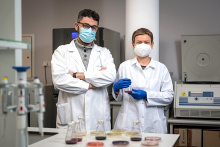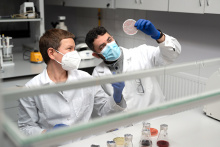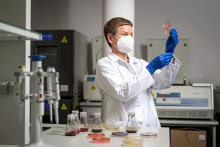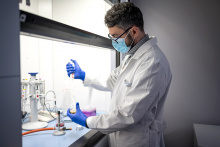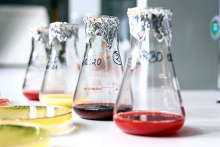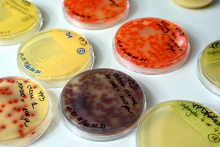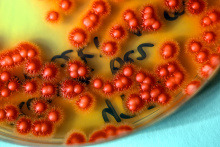Date added: 2021-03-05
A unique platform for the production of proteins using psychrotolerant yeast

- We have created a tool that allows the production of any protein theoretically. A gene from any organism can be introduced into the selected yeast. Of course, in practice it may turn out that not every protein can ultimately be produced in this way, but thanks to our solution, such attempts can be made - says PhD, DSc, Eng. Marta Wanarska, university professor from the Department of Molecular Biotechnology and Microbiology, Faculty of Chemistry, GUT. - We are one of the few teams of scientists in Poland dealing with genetic engineering of yeast, which is much more demanding and capricious than, for example, bacteria - adds prof. Marta Wanarska.
So far, for the efficient production of recombinant proteins (e.g. enzymes used in the production of drugs and food, which are components of cleaning agents, or proteins studied as part of basic research), both biotechnology companies and numerous research centers have used gene expression systems based on microorganisms that effectively carry out in their cells metabolic processes at a temperature of ≥ 30 ̊C. The advantage of the developed system is its suitability for the production of recombinant proteins, about which we know that the temperature ≥ 30 ̊C has a negative impact on the efficiency of their biosynthesis and the expected properties.
- Production of proteins at low temperature is sometimes more efficient also for those that can be produced efficiently at higher temperature. It is also more economical and less burdensome for the environment, because by moving the process to a lower temperature, we make it less energy-consuming - says PhD, DSc, Eng. Hubert Cieśliński, university professor.
Another license agreement with a biotechnology company
Another license agreement for this invention has just been signed with the Gdańsk-based company Blirt S.A., specializing in the production of high-quality enzymes and reagents dedicated for use in Life Science. Earlier, the license agreement was concluded with A&A Biotechnology company from Gdynia. The following persons worked on the preparation and negotiation of the terms of both contracts: MSc, Eng. Robert Bajko from the Center for Knowledge and Technology Transfer at GUT, legal advisor Joanna Ratasiewicz from the Legal Service for Intellectual Property and Projects GUT and patent attorney PhD Justyna Pawłowska from the GUT Patent Attorneys Team.
Gdańsk University of Technology was represented by prof. Janusz Nieznański, Vice-Rector for Internationalization and Innovation, while Blirt S.A. was represented by Marian Popinigis, president of the board and PhD, Eng. Krzysztof Kur, vice president.
- As a biotechnology company producing enzymes and other proteins on an industrial scale, we intend to check the production possibilities of new strains to produce selected enzymes used in molecular diagnostics or the production of biopharmaceuticals. We hope that the discussed expression system will allow for much better productivity, especially in the case of overexpression of thermolabile enzymes operating at low temperatures, derived from psychrotolerant or psychrophilic organisms - says PhD Krzysztof Kur.
The meeting was also attended by PhD, DSc, Eng. Marta Wanarska, university professor and PhD, DSc, Eng. Hubert Cieśliński, university professor, Damian Kuźniewski, director of the Center for Knowledge and Technology Transfer at GUT and Robert Bajko from CTWiT.
Research team
The invention was submitted in the European EPO patent procedure in 2018. The research team from Gdańsk University of Technology was composed of: prof. PhD, DSc Józef Kur * project manager and applicant, PhD, DSc, Eng. Marta Wanarska, university professor, PhD, DSc, Eng. Hubert Cieśliński, university professor, PhD, Eng. Ewelina Krajewska, PhD, Eng. Monika Wicka-Grochocka, PhD, Eng. Anna Pawlak-Szukalska and MSc. Natalia Filipowicz from the Department of Molecular Biotechnology and Microbiology, Faculty of Chemistry. The creators of the invention from the Lodz University of Technology are: prof. PhD, DSc, Marianna Turkiewicz, PhD, DSc, Eng. Aneta Białkowska, MSc. Eng. Ewa Gromek, PhD, Eng. Joanna Krysiak and PhD, Eng. Tomasz Florczak from the Institute of Technical Biochemistry, Faculty of Biotechnology and Food Sciences.
* Professor PhD, DSc, Józef Wojciech Kur (1955–2016) was a long-term head of the Department of Microbiology (later the Department of Molecular Biotechnology and Microbiology) at the Faculty of Chemistry, GUT.


